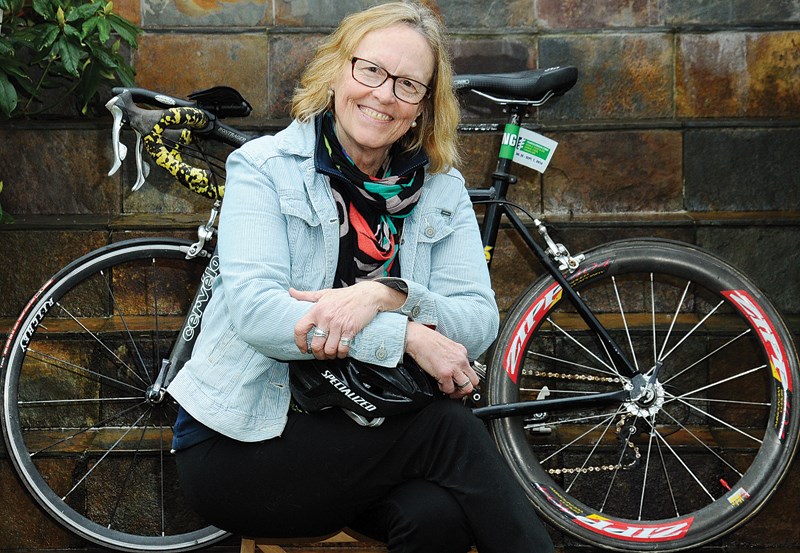You can’t have a triathlon without the stopwatch.
Longtime North Vancouver resident Loreen Barnett has acted as that proverbial stopwatch for several decades now, ensuring that triathlons in Canada and abroad were well-regulated, competitive and given ample room to grow.
For her efforts, she received the prestigious Daryl Thompson Award last Wednesday at Sport BC’s 51st Athlete of the Year Awards.
“It’s really great not only for the local community, but also for my international triathlon family,” Barnett says of her achievement.
The Daryl Thompson Award is given annually to a B.C. individual who has contributed in a significant way to a sport over a long period of time.
“This one I’m really proud of,” says Barnett. “I’ve been away from my own community (without) any involvement and so just to be recognized here at home … I was so surprised.”
Barnett’s involvement in triathlon goes back several decades. Her story charts the steady rise of a local triathlete who became an international organizer for the sport.
But she says the transition from triathlete to organizer and advocate is something that just sort of happened.
“In the early days, we used to have fights about who would hold the stopwatch so that we could have an event. Everybody wanted to be in the race, nobody wanted to make sure everybody was safe and the race was fair,” she says. “I kind of got drawn into that side of things.”
Barnett says she was first drawn to triathlon in general during the 1970s, a time when lifestyle athletics surged in popularity.
“It’s so important, I believe, to live a healthy lifestyle that I swim, bike and run regularly … I think it’s a great lifestyle sport,” she says.
The first official recorded triathlon took place in California in 1974. Barnett says at the time there wasn’t much of a community, locally or nationally for the sport.
While the first Canadian triathlon was staged in Vancouver in 1981, a competition that Barnett participated in, she says it was generally a challenge to organize local triathlon events and the need to organize on a larger scale became apparent.
“We needed an organization because the city wouldn’t let us just start riding our bikes down the street,” she says. “We had to develop a society. We started with just British Columbia and then we grew into Canada.”
Barnett’s held many prominent positions in the world of triathlon over the years, including serving as a board member with Triathlon Canada when it was founded in 1985, and she also served with Triathlon BC.
As the sport gained international prominence and recognition, Barnett joined the International Triathlon Union as its executive director in 2000, right in time for the sport’s inclusion at the Sydney Olympics, the first time triathlon was included as an official event.
“It was such a unique timing for the sport. The Olympic program needed to be modernized and triathlon was there as an edgy, lifestyle-healthy sport. Good for television and good for spectators,” she says.
In order to be considered an Olympic sport, technical rules – a set of standardized rules used to govern the game at an international level – had to be developed. This is one of Barnett’s greatest accomplishments in triathlon.
As a member of the ITU’s technical committee, she helped develop competition rules for the game and was the technical delegate for triathlon at both the Sydney and Athens Olympics.
She’s seen the sport grow in magnitude, something she attributes to its universality and because of how enjoyable and exciting it’s become to watch, due in large part to technical rule changes and venue design.
“I think the biggest thing would be how at the elites, at the highest level of athletes, the impact of the Olympics on the sport it’s become more television and spectator-friendly,” she says. “We learned so much from working with the Olympic people on the way they design their venues.”
Barnett also tells a humorous story where as a triathlon organizer and builder she helped develop a rule that barred the nudity once prevalent in the sport.
“People would come up from the swim and they would just strip down, nude, naked in front of everybody and get into their cycling clothes. That’s one rule we had to put in: there’s no nudity,” she says with a laugh.
But she also says this helped drive the industry to create triathlon suits, commonly worn today in events, where competitors could swim, bike and run in a single outfit.
Barnett says she’s disappointed that Vancouver hasn’t become more of a hotbed for triathlon, citing how perfect some spots in the city would be for a regular competition.
“I always said, the English Bay-West End of Vancouver, whoever created that whole area of the world was thinking about triathlon when they designed it,” she says jokingly.
“We had the (Triathlon) World Championships in 2008 and one of my huge disappointments in life is that that event didn’t become a permanent venue because it’s so perfect,” she says.
But she remains reverent when talking about athletics and North Vancouver, largely because the ITU was based on the North Shore for many years under the organization’s first president, Les McDonald, a North Vancouver resident and legend of Canadian triathlon building.
Barnett is now another local and international legend of triathlon for her efforts in growing the game and helping take it to the world stage.
She still remains part of the ITU, but now sits as a board member. And, of course, she continues to advocate for the sport she loves because of its inclusivity and benefits to health.
“It’s such a natural sport for everyone,” she says. “Everybody, at some level, can either swim, bike or run.”



